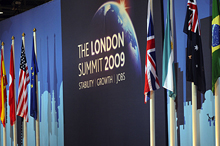
(photo: David Wimsett/UPPA/ZUMA Press)
The IMF and Civil Society
The G-20 Summit: Outcomes and Next Steps
April 15, 2009
The Group of Twenty (G-20) industrialized and emerging markets countries agreed to triple the IMF’s lending capacity to $750 billion in order to assist countries affected by the crisis. They also discussed the need for further reforms on IMF lending and conditionality, and urged the IMF to speed up the implementation of its ongoing governance and quota reform.
The G-20 Summit, which was held in London on April 2, took decisive policy actions to revive the global economy. By agreeing to triple the Fund’s lending capacity to $750 billion, the G-20 leaders showed their commitment to support growth in emerging markets and low-income countries. The G-20 leaders also recognized that the crisis originated in the developed world and supported urgent policy actions to assist vulnerable, low-income countries that are being affected by the economic downturn, especially in sub-Saharan Africa.
Summit outcomes
Below are the key outcomes of the Summit:
- The Summit set a target to double the Fund’s concessional lending to the world’s poorest countries. The tripling of the Fund’s general resources to $750 billion will take place in two steps: (1) by moving ahead with bilateral arrangements, possibly through bonds issued by the Fund, and (2) through an expansion of the New Arrangement to Borrow. The IMF has committed, consistent with its new income model, that additional sales of IMF gold be used, together with surplus income, in order to provide $6 billion in additional concessional and flexible financing for the poorest countries over the next 2–3 years.
- The G-20 also called for doubling the access limits in its concessional lending facilities. This will allow the Fund to assist low-income countries more effectively in meeting the financing needs they face as a result of the global crisis.
- The G-20 leaders also mandated the IMF to make a new general allocation of Special Drawing Rights (SDRs) which will increase global liquidity by injecting $250 billion into the world economy. The details will be worked out in the months ahead, and the SDR allocation will provide a significant boost to the international reserves of African countries.
- The G-20 also affirmed the need for coordinated action on fiscal policy through fiscal stimulus programs. Financial sector regulations were also discussed and there was general agreement to improve regulation in financial markets in order to avoid a new crisis of the same kind.
- The group also discussed the banking crisis and the need to clean up the balance sheet of the banks to achieve an economic recovery in early 2010. The IMF is prepared to participate fully in the efforts to overhaul the rules governing financial markets.
- The G-20 leaders also called on the Fund to conduct regular assessments of the world economies and provide an enhanced early warning system to avoid a new crisis. Such a system will require more than having the proper tools and processes in place, but a commitment by world governments to listen to the warnings, as well as a pledge to confidentiality within the Fund.
Changes in conditionality and governance reform
The G-20 leaders strongly supported the IMF’s reforms on lending and conditionality, especially the creation of the new Flexible Credit Line. During the past months, the IMF’s priority has been to ensure that it continues to provide fast assistance to emerging and developing countries hit by the crisis, with modernized conditionality tailored to the priorities of addressing the crisis while ensuring that vulnerable sectors of the population are adequately protected. The IMF is also trying to limit the conditions attached to its loans to terms that are essential for resolving a country’s immediate economic difficulty.
The world leaders also asked the IMF to implement the package of IMF quota and voice reforms agreed in April 2008, which is the first part of the governance reform process. They also asked the IMF to speed up the next general quota review in order to complete the next review by January 2011, two years before the expected date. The IMF is committed to making progress on these reforms. This will also require member countries finalizing domestic legislations.
Many steps have been taken and more change will come in the months ahead. To this end, the IMF’s Managing Director and senior staff will hold a series of meetings with civil society representatives during the Spring Meetings.
